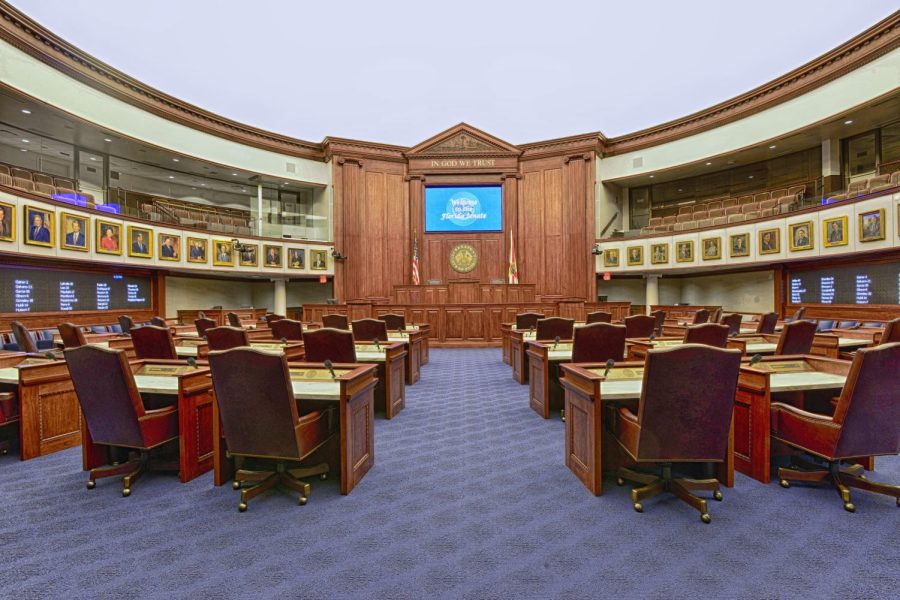FL Senate Introduces Most Restrictive Abortion Ban In Nation
Image of the Florida Senate Chamber, photo courtesy of FLSenate.gov website.
March 31, 2023
On March 7, Florida Republican lawmakers proposed a legislation that would effectively ban abortions after six weeks. This bill expands on the existing 15–week abortion ban with abortions after 6–weeks being allowed only if the mother’s life is at risk or if the fetus has an abnormality where the doctor has to specify the abnormality. As of March 29, the Senate Bill SB 300 “Pregnancy and Parenting Support” proposed earlier in the month by Republican Senator Erin Grall, is expected to pass and be signed into law by Governor Ron DeSantis.
Democratic Senator Linda Stewart weighed in on this bill and had this to say, “The six-week (abortion) ban is an insult to women and a direct attack on our fundamental and reproductive healthcare rights. I trust women to be able to make their own decisions in life and decide what is best for themselves,” said Stewart. “Just over a year after reducing the number of weeks to obtain an abortion to 15, the legislature has once again decided to take up the issue of women’s bodily autonomy by looking to reduce the already limiting time constraint to a mere six weeks.”
Unlike the 15–week abortion ban that Governor of Florida Ron DeSantis signed in April that had no exceptions for rape and incest, the 6–week abortion ban does indeed have exceptions for rape and incest. However, the victims must prove that they were in fact victimized by producing restraining orders, police reports, or other documentation that shows that the victim got pregnant due to rape or incest. The problem with this approach is that it is often difficult to meet those requirements. This will unfortunately result in women getting rejected for abortions due to not having proof. The reality is that most women don’t even know that they are pregnant after 6–weeks and according to a 2021 study from the University of San Francisco, one-in-three women surveyed confirmed the pregnancies after six weeks and one-in-five confirmed their pregnancies after seven weeks. In the study, researchers stated that “Later confirmation of pregnancy is even higher among young people, people of color, and those living with food insecurity, suggesting that gestational bans on abortion in the first trimester will disproportionally hurt these populations.” This shows that by the time many women figure out that they are pregnant, the six–week legal limit would have already passed, meaning that if they wanted to abort for any other reason other than the impractical exceptions, it would no longer be possible.
With medical abortions on the rise and if this law passes, these procedures would only be performed by a physician. The bill states that “any medications intended to cause abortions must be dispensed in-person by a physician and may not be dispensed through the United States Postal Service or by any other courier or shipping service.” With the overturn of Roe v. Wade by the Supreme Court last year, women are depending on medical abortions now more than ever. With this bill, pills like Mifepristone and Misoprostol would now be banned from pharmacies that sell them. Any person that performs an abortion not within the indicated timeline could be imprisoned for up to five years.
This is a very terrifying time for women and they agree that if this legislation gets passed, it will affect women all around the state. Michelle Abrams, a 39–year–old Studio Arts major said, “I’m sorry, I definitely don’t agree with a 6–week abortion ban. Especially since I am currently pregnant and was faced with this decision early on in my pregnancy.” Further, Abrams says, “Women should be able to make the choice for themselves, it’s not up to anyone else. I can also say that it would be easier mentally and emotionally on a woman to have the abortion early on in the pregnancy before possibly hearing or seeing a heartbeat. Forcing a woman to wait six weeks to be allowed to have one done would be more harmful, not only mentally and emotionally but possibly even physically. It should be my choice and my choice alone when I have an abortion or not.”
Jody Smith, a 41–year–old General Studies major, echoes Abrams’ words, “The heroic and tenacious Ruth Bader Ginsberg once said, ‘The decision whether or not to bear a child is central to a woman’s life, to her well–being and dignity. When government controls that decision for her, she is being treated as less than a fully-adult human responsible for her own choices.
‘”This past Monday, March 20, 2023, a Florida bill that would limit abortions after six weeks of pregnancy moved forward in the state’s Senate. In times such as these, I think of all the indomitable women who fought selflessly to get women’s equality where it is today. How would they think and feel about going backward, further away from complete inclusion and equity? Often, I ask myself, if the state of Florida is capable of hastily banning abortion after just six weeks of gestation, what else will soon be denied? As a woman, I am beyond terrified, and collectively; all women should be, because what affects one of us affects all of us.”
Governor DeSantis recently asserted outloud and contemptuously, Florida is where ‘woke goes to die’. “With anti–abortion legislation moving forward in Florida, not only is Florida where ‘woke goes to die’, but it will also be where women go to die,” said Smith. “Do we not remember what desperate measures women had to take pre–Roe v. Wade, or pre–Doe v. Bolton, to have complete autonomy over their bodies, their lives, and their choices? If abortion is a choice you do not support because of religious ideology or personal ethical reasoning, the answer is quite simple; don’t have one. It remains unconstitutional to tell any human being what they can and cannot do with their bodies. Denying abortion access robs women of their autonomy, of their elemental human rights.”
The barbaric bill strips away further abortion rights for women and this ban could affect not only the women who live in Florida but also women from out–of–state that might find themselves traveling to Florida to get an abortion. In other Southern states like Mississippi, or Texas, abortions are banned entirely, so Florida, next to North and South Carolina, acted as a safe–haven for women from out–of–state to obtain the healthcare needs that were being denied them in their original state of residence. If the law passes, it affects the thousands of people from out–of–state that depend on abortion healthcare.
Furthermore, it affects people from low–income families in an often overlooked, yet outsized way, as they may not have the means to travel elsewhere to meet their healthcare need or be able to afford high–quality healthcare that would allow for early pregnancy detection. Clinics serve low–income women and families at reduced or no cost often have a long wait for appointment. A woman could conceivably pass the 6–week mark just waiting to be seen by a qualified physician or have the procedure performed. It could potentially lead to disastrous outcomes for those women and families as the bill risks further eroding the limited access to healthcare that already exists for them.
As Smith noted, how would the women who fought to have abortions legalized in America feel – now that it appears that all their hard work was for nothing? Truly, the choice to have an abortion should only be up to the woman and nobody else as it rips the autonomy that they have over their own bodies.
Women in Florida are slowly having less and less control over their bodies and this is a very serious issue that needs to be addressed immediately. We, as women have to make our voices heard – we simply cannot let our voices be silenced by the male politicians who want to suppress our autonomous rights.





